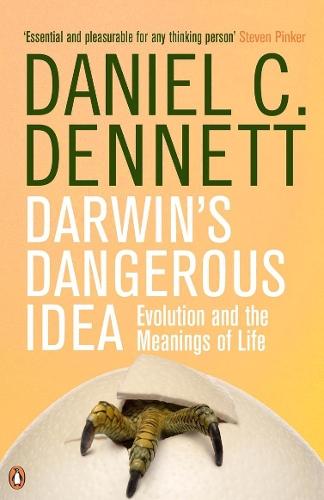Awards
- Short-listed for Pulitzer Prize for Non-Fiction 1996
- Shortlisted for Pulitzer Prize for Non-Fiction 1996.
Overview
This work assesses Darwin's theory of evolution and looks at why it arises such heated debate among scientists, philosophers and sociologists. The book aims to show that Darwinism does not devalue the miracles of life.
Full Product Details
Author: Daniel C. Dennett
Publisher: Penguin Books Ltd
Imprint: Penguin Books Ltd
Dimensions:
Width: 12.80cm
, Height: 2.60cm
, Length: 19.60cm
Weight: 0.398kg
ISBN: 9780140167344
ISBN 10: 014016734
Pages: 592
Publication Date: 26 September 1996
Audience:
General/trade
,
General
Format: Paperback
Publisher's Status: Active
Availability: To order

Stock availability from the supplier is unknown. We will order it for you and ship this item to you once it is received by us.
Reviews
An exploration - at a consistently high level of discourse - of the implications of Darwin's theory of evolution by natural selection, which extend far beyond biology. Dennett (director, Center for Cognitive Studies/Tufts Univ.; Consciousness Explained, 1991, etc.) goes directly to the crux of the natural selection controversy: its implicit denial that a divine first cause is needed to account for the origin of life. While Darwin discreetly avoided a confrontation with orthodox religion, he could not prevent the proponents of divine creation from launching preemptive attacks against his theory. Dennett takes a rationalist tack, pointing out that any theory of a creator begs the question of how life began: If complex DNA molecules cannot have come into being without a creator, must not that creator have been even more complex to have designed the molecules? He argues his points more from a philosophical and logical position than from analysis of the scientific literature on evolution, of which he openly admits only an amateur's understanding. (On the other hand, few of the critics of Darwinian selection have any deeper knowledge of the subject.) Among the fascinating subjects he brings up in passing are the laws of probability, computer simulations of evolution, and the revisionist Darwinian theories of Stephen Jay Gould and Roger Penrose. Ultimately, he contends, the Darwinian revolution's greatest achievement is the denial of the supernatural explanation of the universe, replacing it with an even more miraculous natural explanation. Readers had best be prepared to think long and hard about the points Dennett raises, but those who stay with the author will be amply rewarded for their efforts. (Kirkus Reviews)
This contribution to the Darwin industry comes from an American professor who is in some ways a counterpart to our own Richard Dawkins, forcefully arguing the case that contends Darwin's 'great idea' (natural selection) is all you need to understand how evolution works. Dennett is above all a great communicator of enthusiasm about ideas. In this stunning book he provides an entertaining and illuminating synopsis of the various descendants of Darwinism. But, more importantly, he provides a philosophical analysis of the implications of Darwin's thought for every aspect of our lives. Dennett compares the consequences of Darwinism to 'universal acid', a fictional chemical which can eat through every vessel in which you try to contain it. Controversial topics such as punctuated equilibrium and sociobiology are discussed in their proper context, consciousness is explained, and our place in the universe is pondered. A massive, far-ranging book that will keep you intrigued throughout the long winter evenings. This brilliant exposition of the position known as ultra-Darwinism will surely become a classic. (Kirkus UK)
Author Information
Daniel Dennett is the author of Brainstorms, Brainchildren, Elbow Room, Consciousness Explained and Darwin's Dangerous Idea. He is currently the Distinguished Arts and Sciences Professor and Director of the Center for Cognitive Studies at Tufts University. He lives in North Andover, Massachusetts.



